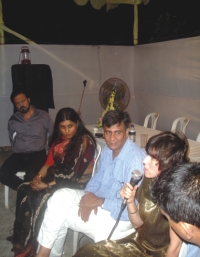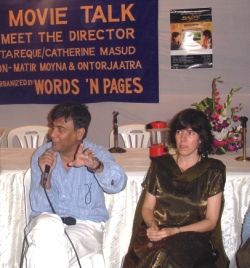|
Film
Meeting the Minds
Elita Karim
 |
According to Catherine Masud, hands-on training for editing and proper camera work is very difficult due to the lack of proper labs and equipment in the country |
As a mere spectator, sitting in the hall and living on this side of a movie theatre, is enough to awe any film buff with the glamourous and the glitzy lives of the characters on screen. Crying and laughing with these characters, movie goers love to feel the joy of victory, agony of defeat, the pain of separation and bliss of reunion The reel life, as opposed to real life, definitely becomes more appealing. As Robert Altman had once said, filmmaking is a chance to live many lifetimes. However, the experience on the other side of the screen, or rather behind the scene, is much more overwhelming, beyond any imaginative fairy tale.
Amidst all the chaos in the country, citizens once again apprehending a fresh spurge of political violence on the streets, the DVD version of Tareque Masud's latest docu-film, Ontorjatra, was officially launched at Words n' Pages, a leading bookstore in Dhaka. Titled as 'Meet the Directors', an event which the store plans to hold at least once a month, the rooftop of the bookstore was decked up for an intimate gathering filled with the media, film lovers, young aspiring artistes and a few well-established names from the world of film and theatre as well. Present at the ceremony were Tareque Masud himself along with his wife Catherine Masud, the Managing Director of Words n' Pages Nima Rahman and eminent actor and director Tariq Anam Khan.
After Masud's international success over the critically acclaimed, award winning film, Matir Moyna, fans probably expected a similar narrative from Ontorjtara. However, that was not the case. “There are many who had expected something similar from Ontorjatra after watching Matir Moyna,” Masud exclaimed. “They would obviously be disappointed.” Unlike the historical narration of Matir Moyna (Clay Bird), Ontorjatra deals with the present situation of families in the modern times, surviving the inter-cultural elements seeping in and blending with traditional ones. It also weaves stories about the relationships between a mother and her son and also members of broken families.
The Masuds spoke of the many experiences that they had to encounter during the making of their films. The Bangladeshi Government had first refused to issue a censor certificate for Matir Moyna, saying it gave a distorted image of the madrasa system, and that it could hurt feelings in this Muslim-dominated country. However, Masud said that many madrasa students and teachers had in fact enjoyed the movie thoroughly and saw nothing wrong with the film's portrayal of madrasas. “I myself studied in a madrasa for seven to eight years,” says Masud. “My father was a very religious person, expected me to attend the madrasa and was not very open to alternative ideas unlike my mother.” Masud as a child in his village, Faridpur, was controlled by his dictatorial father, just like Anu was controlled by Kazi in the movie. “Going to college in Cantonment was probably one of the biggest cultural shocks that I had been through. At least 60% of the students were girls!” he quipped, laughing. In this biographical movie, characters like Kazi, Anu, Ayesha and Asma depicted Masud's own life. “In fact, my older sister was called Asma and had died the same way little Asma died in the movie.”
 |
The Masuds talking about their latest docu-film, Ontorjatra |
According to Masud, people's inflexibility to think and act during dire situations, though might seem quite insignificant, is probably one of the major reasons for greater conflicts and ego-clashes. “Many stick to their ideologies firmly and never think of believing in the alternative,” he explained. “Be it something as major as religion or something as minor as sticking to the idea of homeopathic.” Masud was referring to Kazi in Matir Moyna, a firm believer in homeopathy, who would not let his daughter Asma be treated by doctors and medicines from the city. “This is how many politicise their beliefs, religion and have people believing otherwise.”
As the discussion session was getting more intense with time, the talks drifted to how there is a need for small training institutions for film making, creative writing, theatre and the other arts as well. “A few of us have been planning this for quite some time. Business entities would have to get involved in building such platforms as well,” said Tariq Anam Khan. “A good amount of fund is needed for equipment, teaching materials and also other requirements.
“It's a wonder how in areas like Gulshan, Banani, Uttara and DOHS, we don't have a proper theatre for the audience,” said Catherine Masud. “We also need good labs, editing rooms and proper camera equipment to teach. Unlike Masud, I have not been fortunate enough to get the proper hands-on training that he did. Rather, I learnt by doing and let me tell you, hands-on training for editing and proper camera work will be extremely difficult here.”
“Primary workshops can be held at least for those who are interested,” pointed out Masud, hinting at the lack of space as well. “The problem is, these things would need to be privatised since one government would probably give the approval of conducting this on a large scale and then the next government would just close it down.”
Words n' Pages is also holding several Reading Circle sessions every month. Though being done on a small scale, these efforts may help to bring young minds together so that their creative skills can be explored and nurtured.
Copyright (R) thedailystar.net 2006 |
